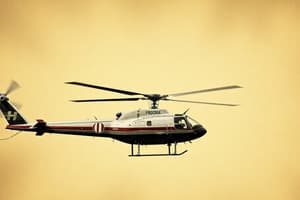Podcast
Questions and Answers
What is the most efficient boundary layer control method accomplished by?
What is the most efficient boundary layer control method accomplished by?
- Using suction or blowing techniques (correct)
- Increasing surface roughness
- Installing vortex generators
- Reducing the angle of attack
What state of flight occurs when the main rotor system is turned by the relative wind rather than engine power?
What state of flight occurs when the main rotor system is turned by the relative wind rather than engine power?
- Normal flight
- Controlled descent
- Autorotation (correct)
- Hovering
Which of the following describes low lift to drag ratio?
Which of the following describes low lift to drag ratio?
- High maneuverability aircraft
- Slow speed aircraft
- High efficiency aircraft
- Stall-prone aircraft (correct)
What method involves varying the pitch of rotor blades individually to control rotor disc tilt?
What method involves varying the pitch of rotor blades individually to control rotor disc tilt?
What part is responsible for disconnecting the main rotor from the engine during engine failure?
What part is responsible for disconnecting the main rotor from the engine during engine failure?
What term describes the difference in lift between advancing and retreating blades?
What term describes the difference in lift between advancing and retreating blades?
If an aircraft is flying at 350 MPH into a headwind of 75 MPH, what will its ground speed be?
If an aircraft is flying at 350 MPH into a headwind of 75 MPH, what will its ground speed be?
Which type of drag increases as an aircraft gains altitude?
Which type of drag increases as an aircraft gains altitude?
What effect does the up-going wing experience during a turn in a high wing aircraft?
What effect does the up-going wing experience during a turn in a high wing aircraft?
What happens to the stalling angle during a turn?
What happens to the stalling angle during a turn?
What is the assumption of the ISA regarding environmental conditions?
What is the assumption of the ISA regarding environmental conditions?
When analyzing lift on a delta wing at a given angle of attack, what can be said compared to a high aspect ratio wing?
When analyzing lift on a delta wing at a given angle of attack, what can be said compared to a high aspect ratio wing?
Which statement correctly describes the movement of the Centre of Gravity (C of G) in flight?
Which statement correctly describes the movement of the Centre of Gravity (C of G) in flight?
What is the relationship between altitude and pressure as altitude increases?
What is the relationship between altitude and pressure as altitude increases?
Which statement describes the flow of air related to induced drag?
Which statement describes the flow of air related to induced drag?
How does pressure change concerning temperature decreases?
How does pressure change concerning temperature decreases?
What happens to an aircraft when both wing tip sections lose lift simultaneously?
What happens to an aircraft when both wing tip sections lose lift simultaneously?
In straight and level flight, what direction of force must be produced by the tail of the aircraft?
In straight and level flight, what direction of force must be produced by the tail of the aircraft?
What altitude is reached when the pressure is half of that at sea level?
What altitude is reached when the pressure is half of that at sea level?
If gauge pressure on a standard day at sea level is 25 PSI, what is the absolute pressure?
If gauge pressure on a standard day at sea level is 25 PSI, what is the absolute pressure?
What is considered the standard sea level pressure?
What is considered the standard sea level pressure?
When an aircraft's weight increases, what happens to the minimum drag speed?
When an aircraft's weight increases, what happens to the minimum drag speed?
Dihedral wings are designed to combat instability in which type of flight condition?
Dihedral wings are designed to combat instability in which type of flight condition?
The increase in angle of incidence from wing root to wing tip is known as what?
The increase in angle of incidence from wing root to wing tip is known as what?
Flashcards are hidden until you start studying
Study Notes
Boundary Layer Control
- Efficient boundary layer control methods optimize airflow and enhance aerodynamic performance.
Flight States
- Main rotor system turns due to relative wind, not engine power, signifying autorotation.
Lift-to-Drag Ratio
- Low lift-to-drag ratio is characteristic of certain aircraft designs, influencing efficiency.
Rotor Blade Control
- Individual rotor blade pitch variation controls the tilt of the rotor disc, affecting flight maneuverability.
Rotor Disconnection
- A specific component disconnects the main rotor from the engine when RPM drops critically for safety.
Lift Distribution
- The difference in lift between advancing and retreating blades affects rotor efficiency and stability.
Wing Setting Angle
- "Wing setting angle" refers to the angle at which the wing is mounted, influencing aerodynamics.
Ground Speed Calculation
- An aircraft flying at 350 MPH into a 75 MPH headwind has a ground speed of 275 MPH.
Drag Types with Altitude
- Certain drag types, such as induced drag, increase as altitude rises, affecting performance.
Roll Motion Correction
- Correcting for rolling disturbance re-establishes stable flight about the longitudinal axis.
Aerofoil Air Layer
- The slower moving air layer over an aerofoil is known as the boundary layer, crucial for lift.
Engine Power Loss
- If engine power is lost while flying level, the aircraft will gradually descend.
Mach Number Context
- If free stream Mach number is 0.78 and local Mach number is 1, the critical Mach number for the aerofoil is a key performance metric.
Pressure Altitude and Density
- Density altitude is pressure altitude corrected for temperature; it affects aircraft performance.
Stall Characteristics
- On a straight-wing aircraft, stall typically initiates at the root for high thickness ratio wings.
Lift in Turns
- In a high-wing aircraft during a turn, the down-going wing gains lift, stabilizing the aircraft.
Lift on Delta Wings
- For the same angle of attack, delta wings generally produce greater lift compared to high aspect ratio wings.
Standard Atmosphere (ISA)
- ISA assumes a standard day, often taken from 45 degrees latitude for reference.
Atmospheric Pressure Changes
- As altitude increases, pressure decreases, often described as an exponential trend.
Stall Angle in Turns
- During a turn, the stalling angle of an aircraft decreases, affecting safety margins.
Center of Gravity Movement
- The center of gravity (C of G) shifts during flight due to fuel consumption and passenger movement.
Pressure Relationships
- Pressure decreases inversely with temperature; they are closely related in aerodynamics.
Induced Drag Flow
- Induced drag occurs when airflow over a wing is directed towards the root and tip in a span-wise manner.
Swept Wing Aircraft Stability
- Lost lift at both wing tip sections on a swept wing results in a downward pitch moment.
Tail Force Requirement
- Tail force must counter any imbalance between thrust-drag and lift-weight to maintain level flight.
Altitude and Pressure Relations
- When sea-level pressure is halved, the associated altitude reflects significant elevation.
Gauge Pressure Calculation
- Absolute pressure can be determined by adding gauge pressure to atmospheric pressure.
Sea Level Pressure
- Standard sea level pressure is commonly referenced as 29.92 inches of mercury (Hg) or 1013.25 hPa.
Minimum Drag Speed
- Increased aircraft weight raises the speed at which minimum drag occurs, affecting performance efficiency.
Lift Coefficient Graph
- A graph of angle of attack versus lift coefficient illustrates the relationship between the two.
Dihedral Wings and Stability
- Dihedral angles in wings enhance lateral stability, counteracting roll disturbances.
Wing Incidence Definition
- Change in angle of incidence from the root to the tip of a wing affects overall lift.
Center of Gravity Percent Calculation
- If the Mean Aerodynamic Chord (MAC) is 200” and the C.G. is 30” behind the leading edge, it lies at 15% of the MAC.
Aspect Ratio Definition
- The aspect ratio refers to the ratio of the wing's span length to its mean chord depth.
Transonic Range Aircraft
- Aircraft operating in the transonic range most often employ specific design modifications to manage airflow.
Gas Turbine Inlet Effectiveness
- For maximum effectiveness, airflow entering the inlet of a gas turbine must be smooth and undisturbed.
Mach Speed Classification
- Speeds between 1.25 and 2.5 Mach classify the aircraft in the transonic range, requiring special aerodynamic considerations.
Longitudinal Stability
- Longitudinally stable aircraft will naturally return to level flight after disturbances around the longitudinal axis.
Vortex Generator Effectiveness
- Vortex generators on wings are effective at delaying flow separation, enhancing lift and reducing stall risks.
Studying That Suits You
Use AI to generate personalized quizzes and flashcards to suit your learning preferences.




